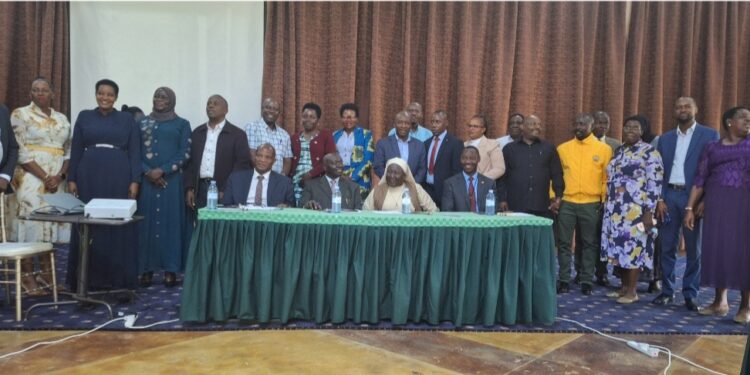The Undersecretary – Office of the President, Mr. Emmanuel Walani has urged the Resident District Commissioners (RDCs), Resident City and Commissioners (RCCs) and their deputies to make the achievements of the National Resistance Movement (NRM) vividly visible to Ugandans so that they are able to appreciate the government.
According to Mr. Walani, such a strategy will act as a strong base for Ugandans to reward the NRM government by voting it back to power in 2026.
“As we appreciate effective leadership, we should be able to walk the talk. Don’t only put on yellow but also talk yellow so that we are able to shape the future of this country,” he said.
Mr. Walani made the remarks today while opening a 3- day capacity building workshop for RDCs, RCCs, deputies, DISOs and DISOs in Central region, being held at Maya Nature Resort, Wakiso District.
He advised the commissioners that they should be able to play their fundamental role of serving H.E the President with the intention of steering the socio-economic transformation of Uganda.
“We should be guided by the four core principles of the NRM which include Patriotism, Pan-Africanism, Socio-economic transformation and democracy,” he said.
“These capacity building exercises help us to grow and sharpen the ability to be able to address challenges,”
Mr. Walani further informed the RDCs that it’s their role to monitor government programs and projects in that services are effectively delivered to the citizens.
“In the three days you are going to be here, identify the bottlenecks that hinder service delivery and work as a team to find solutions to them,” he said.
“We should always turn the challenges into opportunities.”
Furthermore, Mr. Walani urged the participants to understand the objective of the National Development Plan IV (NDP IV) and contextualise it in order to be able to execute its mandate of driving Uganda into a middle income status by 2040.
“When you laco knowledge, you will embarrass the President,please continue learning and sharpen our ability to fulfil our mandate.”
The Senior Presidential Advisor-Mobilisation in the Office of the President, Lt. Col. Kibrai Ambako underscored the critical role of Revolutionary methods of work when it comes to enabling leaders to achieve positive change in society.
“The methods are used to dispel and counter diversionary, negative and subversive tendencies towards achieving set goals for the common good. The methods are used with courage, fearlessness, with violence to push crazy ideas that no one can willingly go for, against the status-quo to achieve radical change,”he said.
Lt. Col. Ambako added that through revolutionary methods of work, the NRM government managed to come into power, consolidated the people’s victory and had since registered massive achievements in the recovery and transformation of Uganda’s economy, peace and security, infrastructure, social/culture and political programs.
“To register the achievements, the revolution has been and is still being guided by the vision, mission, strategic objectives and the use of Revolutionary methods of work,” he stressed.
“Revolutionary methods of work are very important in facilitating operationalization of mandates and offering leadership to address concerns, achieve service delivery, socio-economic transformation and democracy towards securing our future.”
The Managing Director of Uganda Printing and Publishing Corporation, Prof. Sudi Nangoli presented a paper on Monitoring and Evaluation of government programs and projects.
He said for any officials to excellently undertake Monitoring and Evaluation he should have a positive mindset, resilience power, sixth sense and balanced success intentions.
“You should study work-plans and budgets, analyse financial flows, if funds were released and received, check on the status of outputs and also if outputs are completed, examine functionality and use by the population.”
Prof. Sudi also revealed that the aspect of effective monitoring and evaluation is still lacking in the country.
“Globally, Uganda is ranked 127 out of 190 countries according to the World Bank Global M&E Index report. That global position relates to an M&E performance score of 42 percent. The best country is Norway at 95 percent and the bottom is Burundi at 14 percent.
The Dean of RDCs and Wakiso RDC, Ms. Justine Mbabazi emphasised team work among the commissioners, DISOs and DISOs.
“We were all appointed by one person, avoid conflicts and we work together to ensure that we effectively fulfil our mandate.”
Today’s session was also attended by officials from the Office of the President.
Do you have a story in your community or an opinion to share with us: Email us at editorial@watchdoguganda.com









